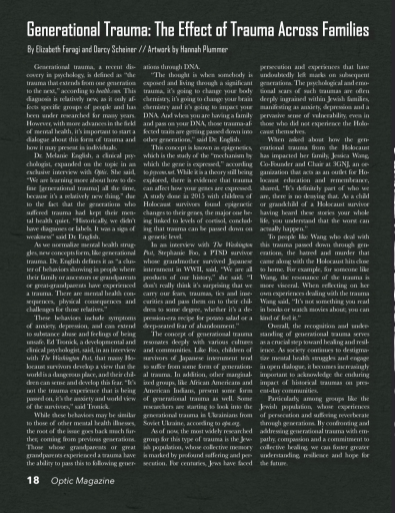
Generational trauma, a recent discovery in psychology, is defined as “the trauma that extends from one generation to the next,” according to health.com. This diagnosis is relatively new, as it only affects specific groups of people and has been under researched for many years. However, with more advances in the field of mental health, it’s important to start a dialogue about this form of trauma and how it may present in individuals.
Dr. Melanie English, a clinical psychologist, expanded on the topic in an exclusive interview with Optic. She said, “We are learning more about how to define [generational trauma] all the time, because it’s a relatively new thing,” due to the fact that the generations who suffered trauma had kept their mental health quiet. “Historically, we didn’t have diagnoses or labels. It was a sign of weakness” said Dr. English.
As we normalize mental health struggles, new concepts form, like generational trauma. Dr. English defines it as “a cluster of behaviors showing in people where their family or ancestors or grandparents or great-grandparents have experienced a trauma. There are mental health consequences, physical consequences and challenges for those relatives.”
These behaviors include symptoms of anxiety, depression, and can extend to substance abuse and feelings of being unsafe. Ed Tronick, a developmental and clinical psychologist, said, in an interview with The Washington Post, that many Holocaust survivors develop a view that the world is a dangerous place, and their children can sense and develop this fear. “It’s not the trauma experience that is being passed on, it’s the anxiety and world view of the survivors,” said Tronick.
While these behaviors may be similar to those of other mental health illnesses, the root of the issue goes back much further, coming from previous generations. Those whose grandparents or great grandparents experienced a trauma have the ability to pass this to following generations through DNA.
“The thought is when somebody is exposed and living through a significant trauma, it’s going to change your body chemistry, it’s going to change your brain chemistry and it’s going to impact your DNA. And when you are having a family and pass on your DNA, those trauma-affected traits are getting passed down into other generations,” said Dr. English.
This concept is known as epigenetics, which is the study of the “mechanism by which the gene is expressed,” according to psycom.net. While it is a theory still being explored, there is evidence that trauma can affect how your genes are expressed. A study done in 2015 with children of Holocaust survivors found epigenetic changes to their genes, the major one being linked to levels of cortisol, concluding that trauma can be passed down on a genetic level.
In an interview with The Washington Post, Stephanie Foo, a PTSD survivor whose grandmother survived Japanese internment in WWII, said, “We are all products of our history,” she said. “I don’t really think it’s surprising that we carry our fears, traumas, tics and insecurities and pass them on to their children to some degree, whether it’s a depression-era recipe for potato salad or a deep-seated fear of abandonment.”
The concept of generational trauma resonates deeply with various cultures and communities. Like Foo, children of survivors of Japanese internment tend to suffer from some form of generational trauma. In addition, other marginalized groups, like African Americans and American Indians, present some form of generational trauma as well. Some researchers are starting to look into the generational trauma in Ukrainians from Soviet Ukraine, according to apa.org.
As of now, the most widely researched group for this type of trauma is the Jewish population, whose collective memory is marked by profound suffering and persecution. For centuries, Jews have faced persecution and experiences that have undoubtedly left marks on subsequent generations. The psychological and emotional scars of such traumas are often deeply ingrained within Jewish families, manifesting as anxiety, depression and a pervasive sense of vulnerability, even in those who did not experience the Holocaust themselves.
When asked about how the generational trauma from the Holocaust has impacted her family, Jessica Wang, Co-Founder and Chair at 3GNJ, an organization that acts as an outlet for Holocaust education and remembrance, shared, “It’s definitely part of who we are, there is no denying that. As a child or grandchild of a Holocaust survivor having heard these stories your whole life, you understand that the worst can actually happen.”
To people like Wang who deal with this trauma passed down through generations, the hatred and murder that came along with the Holocaust hits close to home. For example, for someone like Wang, the resonance of the trauma is more visceral. When reflecting on her own experiences dealing with the trauma Wang said, “It’s not something you read in books or watch movies about; you can kind of feel it.”
Overall, the recognition and understanding of generational trauma serves as a crucial step toward healing and resilience. As society continues to destigmatize mental health struggles and engage in open dialogue, it becomes increasingly important to acknowledge the enduring impact of historical traumas on present-day communities.
Particularly, among groups like the Jewish population, whose experiences of persecution and suffering reverberate through generations. By confronting and addressing generational trauma with empathy, compassion and a commitment to collective healing, we can foster greater understanding, resilience and hope for the future.
